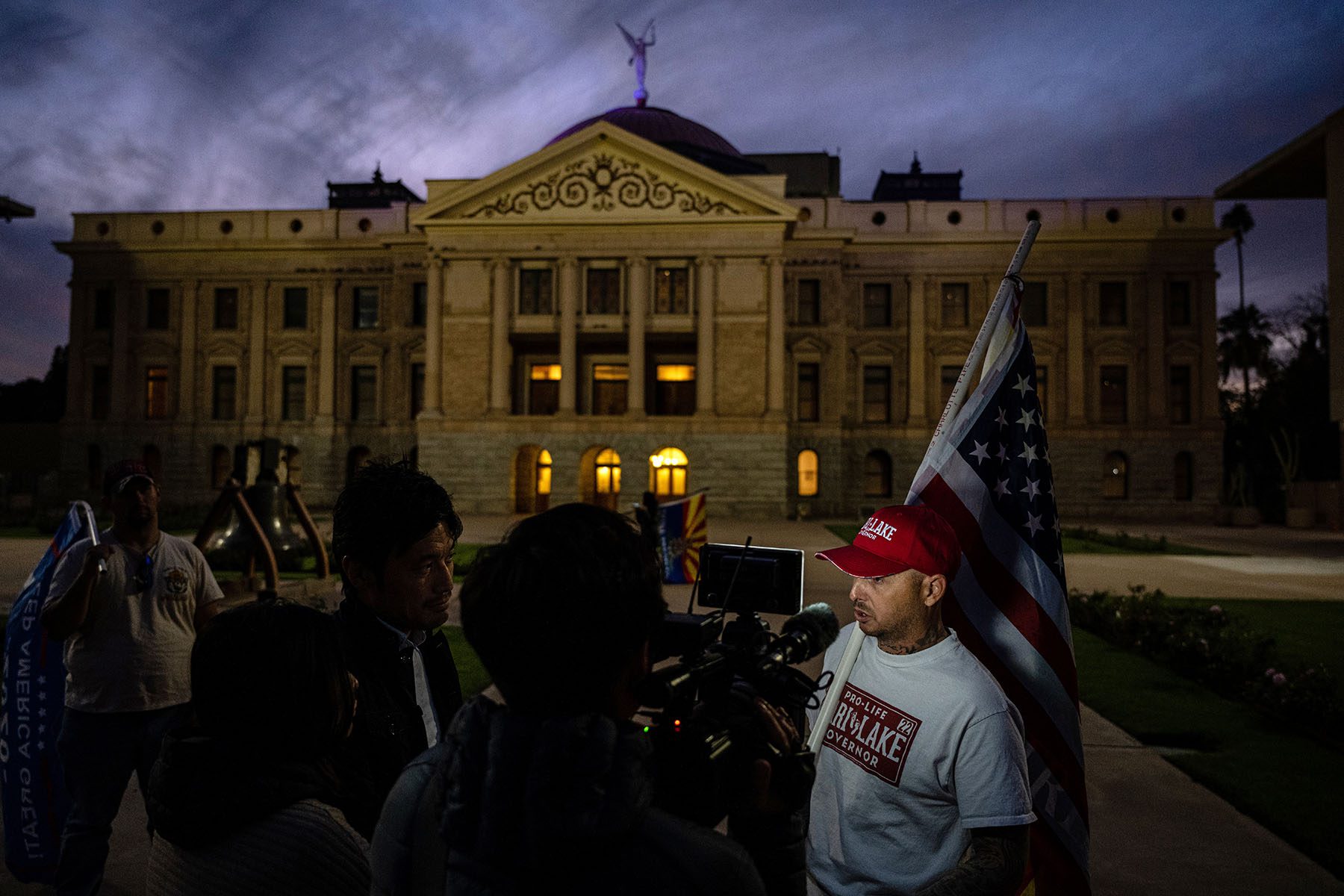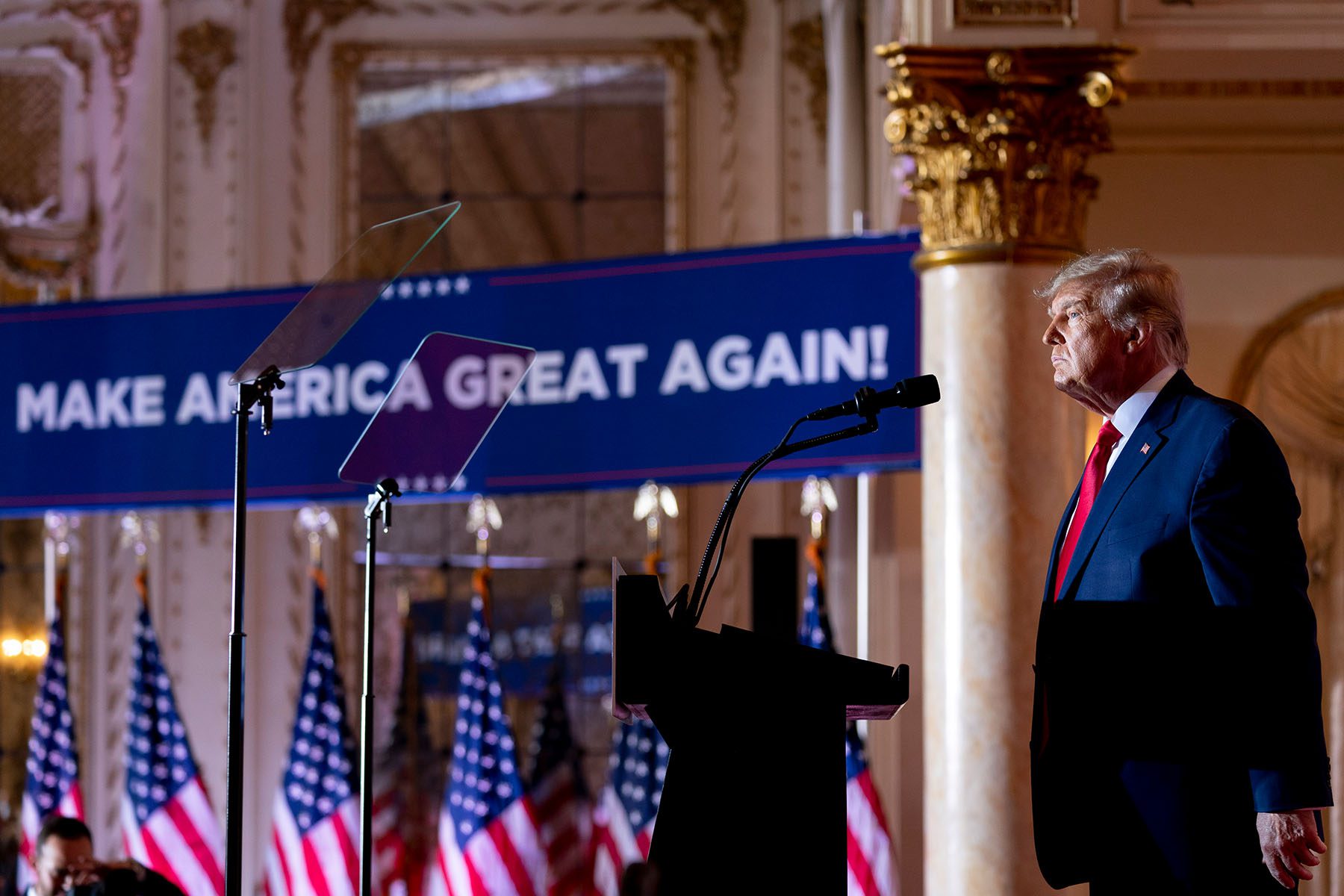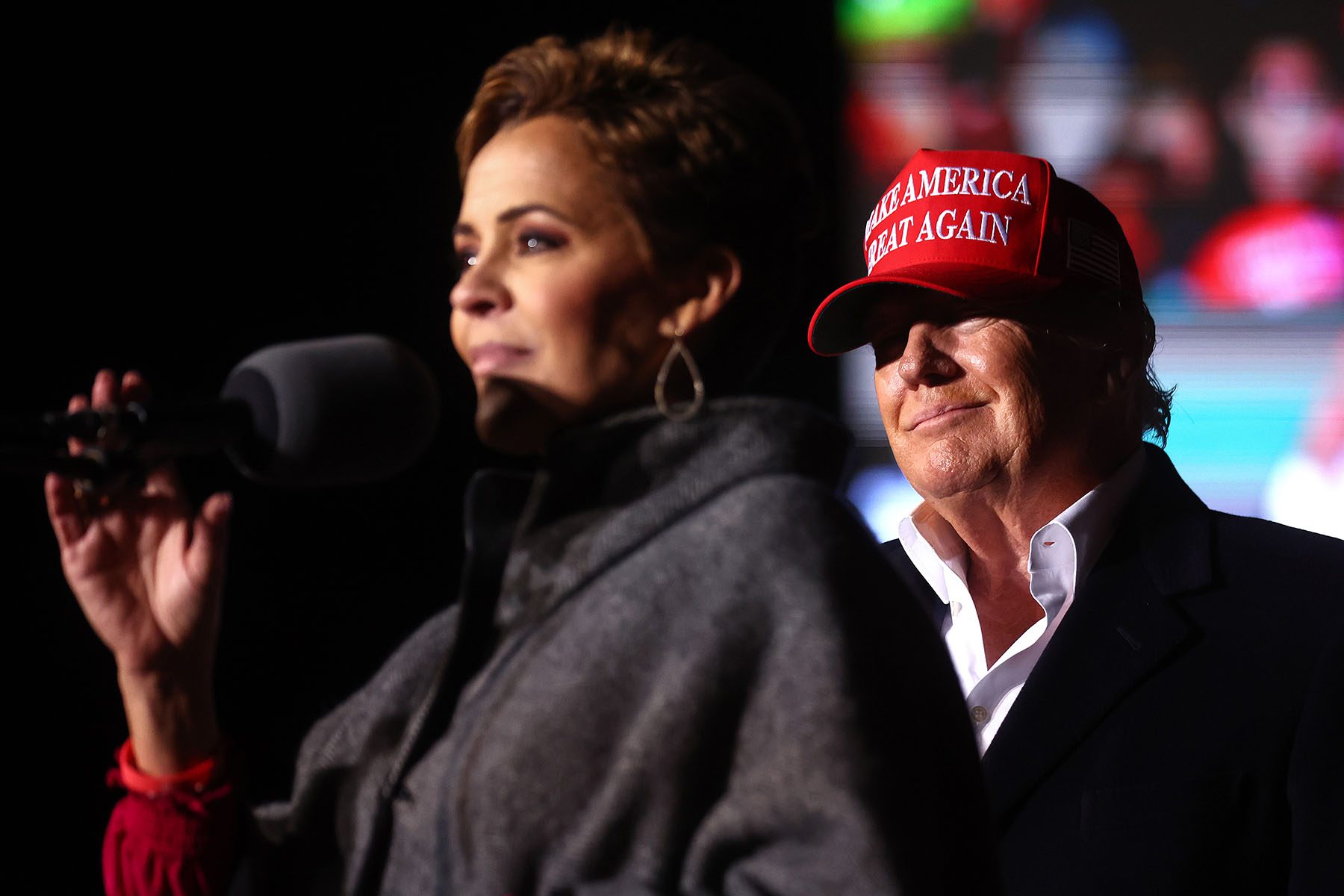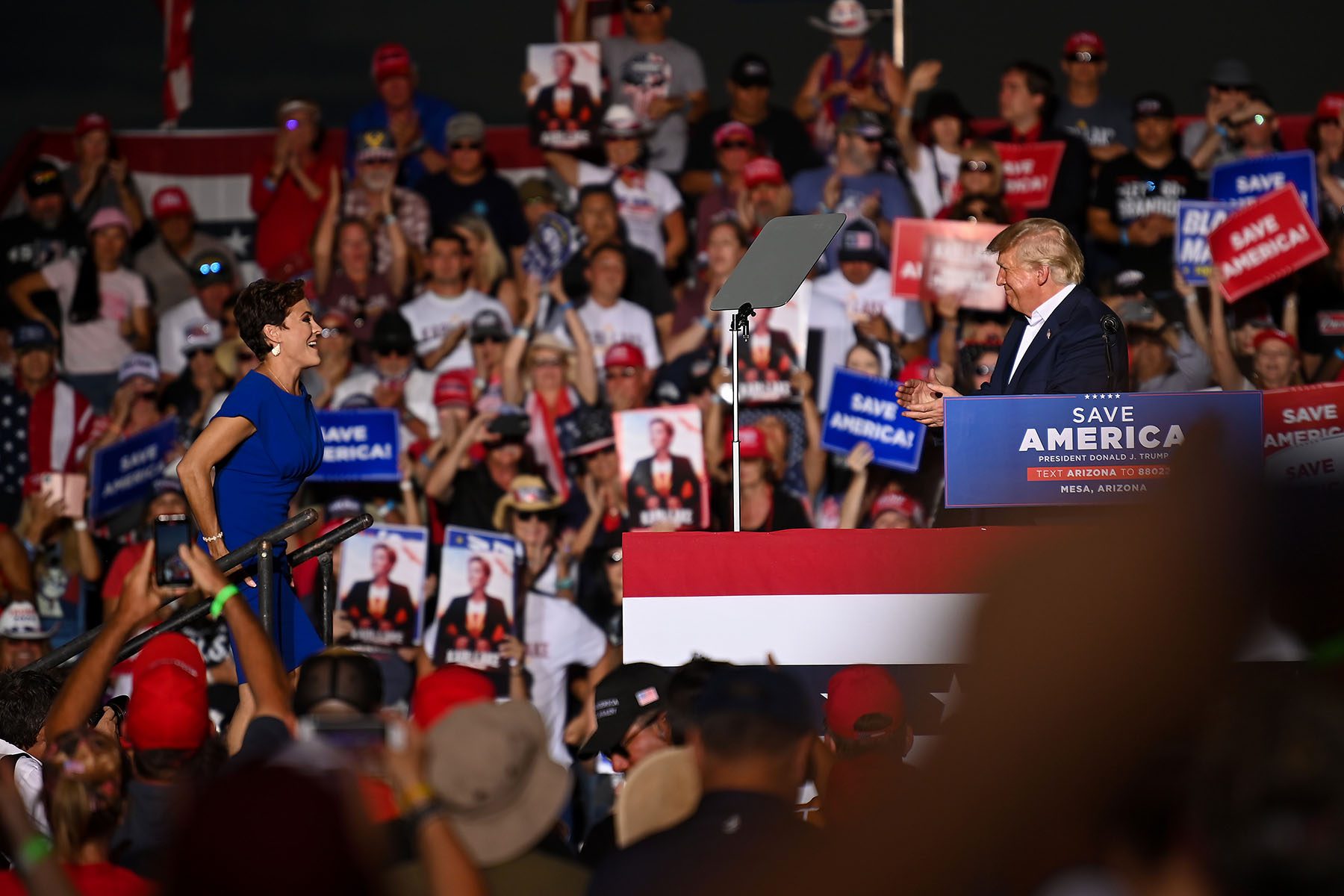We’re making sense of the midterms. Subscribe to our daily newsletter for election context and analysis.
Many of the Republican candidates who staked their campaigns this midterm year on questioning the integrity of U.S. elections have lost and conceded — a low bar for democratic norms but one that political observers weren’t certain would be cleared. But Kari Lake, one of the most prominent election deniers of the cycle, has so far shown little sign of acknowledging her own loss in the Arizona governor’s race.
Instead, she has mirrored tactics used by former President Donald Trump, turning to social media to sow doubts about her loss. The Wall Street Journal reported that Lake was at Trump’s Mar-a-Lago resort in Florida on Thursday, the same day she released a video in which she questioned how elections were run in Arizona.
“I am busy here collecting evidence and data. Rest assured I have assembled the best and brightest legal team, and we are exploring every avenue to correct the many wrongs that have been done this past week,” she said.
Her refusal to concede came in the same week that Trump, who is under several criminal investigations, appeared at his Mar-a-Lago resort to announce his next bid for president. His remarks included casting doubts about elections.
The insistence by both Trump and Lake without proof that their losses may have been caused by nefarious actions are signs that the danger of election denialism has not passed even as so many election deniers bowed out in the end, according to experts.
Democrat Katie Hobbs defeated Lake by roughly 17,000 votes out of more than 2.5 million cast, according to Decision Desk HQ, which reports nearly all ballots have been counted. Other news outlets have also called the close race for Hobbs.
“Arizonans know BS when they see it,” Lake, 53, tweeted Monday night to more than 700,000 followers after Hobbs, 52, was declared the winner.

Since then, Lake has highlighted claims that some voters in Maricopa County, Arizona’s most populous, were disenfranchised because of technical issues with ballot tabulation machines and long lines. Election officials tried to address reported issues in real time and fact-check claims about the vote counting. Officials had warned the public that posting election results can take days after Election Day. Lake has also been critical of Hobbs, who is the current secretary of state, for not recusing herself. Election officials have noted that votes are counted and tabulated by local administrators.
While Lake encouraged people to “cure” or fix issues with rejected ballots, not an unusual step for a candidate in a close race, she has largely focused on questioning the process of counting ballots.
Her official campaign account, the “Kari Lake War Room,” has tweeted unfounded claims that voting was “flawed.” Lake has also retweeted people’s messages about her, including: “She will not go quietly into the night. She intends to stand and fight.”
Trump’s challenges against his loss in 2020 went much further, and included an attempt to overturn the election. He encouraged a violent mob to storm the Capitol — and when news outlets reported Tuesday that he would seek another presidential bid, Lake offered an endorsement.
On Monday, Trump posted about the Arizona governor’s race on his Truth Social account and claimed the voting process was rigged.
“I assume everyone is watching Arizona as the great Kari Lake’s easy election win is slowly, yet systematically, being drained away from her, and from the American people,” he wrote. “This is a very sad thing to watch.”
While Lake’s denial of the results doesn’t change them, it does chip away at foundations of American democracy. Erica Frantz, an expert on authoritarianism who is an associate professor of political science at Michigan State University, said Lake’s insistence that there was nefarious activity attempts to challenge the public understanding that U.S. elections are secure.

“It’s very important that we recognize when elections are free and fair and when they aren’t, because that’s the backbone of any democracy,” she said. “So to the extent that politicians create lies about the integrity of the process, that’s very much troubling. It sets the stage for future intervention in democratic elections that aren’t helpful.”
Carah Ong Whaley, academic program officer at the Center for Politics at the University of Virginia, whose research centers on political learning and participation for democracy, said the attention Lake drew before the election makes her latest denials even more serious.
“Kari Lake, she is a populist candidate and she has a huge base,” Ong Whaley said. “That’s why Trump ended up endorsing her. He saw that she could draw a crowd and that she has that media savvy.”
Lake had no experience in elected office when she launched her bid for governor in a crowded primary, and she — like Trump — had presented herself as a political outsider. But the former television anchor propelled her campaign in part through unfounded suspicions about elections and public ridicule of the press — all while in soft-focused lightning. Lake’s husband was often spotted filming her when she spoke to reporters. She often had a mic at the ready, and was a fixture on conservative media.
Ahead of the election, Lake avoided answering whether she would accept any result, including a potential loss.
“I’m going to win the election, and I will accept that result,” she told CNN’s Dana Bash.
The race between her and Hobbs took place in a state that will be a battleground for the 2024 presidential election. A governor here helps certify the elections and is able to push for policy that could change the voting system, something that Lake committed she would do. Lake has called Biden “an illegitimate president.”
While election deniers lost in several statewide races in key battleground states, they won in more solid red states: Secretary of state candidates who embraced the lies about 2020 won in the Republican strongholds of Alabama, Indiana, South Dakota and Wyoming. And some incumbent politicians who cast doubt about the 2020 elections also won reelection.
“There’s a serious division between the parties and then within the Republican Party,” said Ong Whaley. “I’m glad that some people are breathing a sigh of relief, but I’m more in the category of, we need to continue to watch this, this is going to be problematic.”
Jordan Wood, executive director of democracyFIRST, a political action committee that challenges election deniers, said the concession of other election deniers may shift how people perceive Lake’s claims.
“We’re not dealing with a big group of candidates in high-profile races that are going to refuse to accept these losses and try to fight them,” he said. “I think that really weakens Kari Lake’s position if she decides to do that. Because she’s in many ways out on her own.”
Ong Whaley said it’s worth noting that the Arizona governor’s race was close enough that it may signal to Lake that her focus on election denialism could propel supporters in the future.
“She has put herself into politics,” Ong Whaley said of Lake, who quit her job in journalism. “I don’t see her going away anytime soon.”


Frantz said the dynamics of Trump’s third bid for president are also different than the last time — in part because election deniers did lose in key races this year. If top officials within the Republican Party distance themselves from lies about election integrity that could diminish it as a platform for not just Trump but others.
“There’s often a tendency to look to ordinary voters as, ‘Why are they supporting these things? What could have happened in the U.S. that they feel this way?’ But oftentimes, these processes are being driven from above,” Franz said. “So what is critical is that elites in the Republican Party see it is in their career interests to move away from narratives that endorse violence and that question the integrity of the elections.”
Melissa Ryan, editor of the Ctrl Alt-Right Delete newsletter who tracks the extreme right, said it’s important to acknowledge that democracy was upheld last week because people warned about the stakes.
“I think one of my biggest concerns coming out of how well Democrats unexpectedly did is, I’m already seeing some, ‘Oh, maybe democracy wasn’t in danger after all, and people were exaggerating the threat.’ And it seems to me what happened is enough people were freaked out about the potential loss of democracy, the loss of rights — that they made a point to go out and vote.”
But Ryan said people must stay vigilant as new voting restrictions are proposed, gerrymandered districts remain a reality and candidates who promote extremist policies lose elections.
“This is a faction that really doesn’t want to have elections anymore. They want to seize power. So it’s also important to keep an eye on, as they realize that it’s going to be harder and harder to win free and fair elections in most places … what are they going to turn to next? Because it’s not like they’re just going to be like, ‘Oh, well, we lost the election, next time.’ I don’t think that’s going to be the way that they keep progressing.”





